Dolphin/Gestió de fitxers
Dolphin or Konqueror?
Dolphin is the file management application of Plasma Workspace. It is designed to be simple to use, yet powerful.
Konqueror was the default file manager in KDE 2 and 3, and is still available for those who prefer its interface. It is a web browser, a file manager, media viewer and more. For file management it uses the Dolphin KPart, and so has all of the functionality of Dolphin.
Descobrir el Dolphin
La primera secció proposa una visita guiada de Dolphin. La segona va dels conceptes dels diferents tipus d'adreces d'interès. La tercera debat sobre la gestió d'arxius. Finalment, examinem «les coses més útils». Les imatges són clicables -per veure una vista engrandida-.
Introducció a Dolphin
Dolphin és el gestor de fitxers del KDE Software Compilation.
Us mostraré com utilitzar Dolphin per les tasques corrents de gestió de fitxers, i com personalitzar-lo en funció de les vostres necessitats.
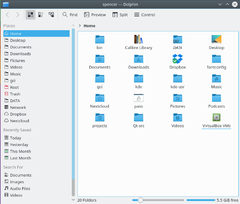
Quan obrim Dolphin des del menú Kickoff aquest mostra el vostre directori inicial, per omissió és el vostre directori inici.
To open a file, or go to a folder just click on it. (This can be changed to double-click in → → or in → → for older versions of System Settings)
Per seleccionar i deseleccionar fitxers i carpetes mantenint el cursor del ratolí sobre la icona i fer clic al signe més emergent per seleccionar i al signe menys per deseleccionar. Com segueix:
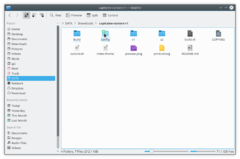
En fer clic al signe més, aquest fitxer o carpeta serà afegida a la vostra selecció. Podeu seleccionar diversos fitxers de la mateixa manera. La selecció també es pot fer arrossegant un rectangle (de vegades anomenat el mètode «rubber band»), i seleccionant i deseleccionant amb Ctrl + clic per a un i Majús. + clic per a un interval consecutiu.
Molts fitxers seleccionats s'assemblarà a això:

Creating a new folder: You can create a new folder in the active directory using → or the F10 shortcut.
Tabs: Dolphin supports tabbed browsing. A new tab can be opened for example from → (if you have enabled menu bar), by Ctrl + T or by middle mouse click on folder icon and navigation buttons.
Dolphin s'obrirà per omissió quan fem clic sobre qualsevol carpeta. També es pot iniciar des del menú Kickoff.
The Interface
Location Bar
Dolphin integra un nou concepte d'usar la barra de localització d'una manera més ràpida i precisa: per tant s'utilitza una barra de localització «fil d'Ariadna». En lloc de mostrar el camí complet, s'anuncien només els punts de navegació en forma de botons. En fer clic en un d'aquests botons, es va directament a aquesta carpeta. D'aquesta manera es pot arribar a una carpeta pare des d'una subcarpeta d'una manera molt ràpida.
Entre els botons que representen una carpeta hi ha una petita fletxa la qual és un botó. En fer clic a la fletxa podreu veure una llista de tots els subdirectoris en el mateix nivell que l'actual, oferint-vos un canvi ràpid de directori.
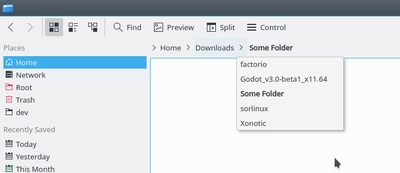
There is also a classical location bar which displays the complete path. To use this style you can right click on the Location Bar and select . If you want the Location bar to become editable, trigger the keyboard shortcut Ctrl + L or select → → . By clicking on the free space next to the last displayed folder in the breadcrumb style you can switch to an editable Location Bar as well. If the editable style is selected a checkmark is displayed at the end of the location bar. This checkmark is a button which can be used to change back to the breadcrumb style. Of course menu and keyboard shortcut can be used, too.
Split View
Dolphin offers the possibility to split the current folder view so that two folder views are displayed next to each other as known from Midnight Commander, or Krusader. This is a very comfortable view to copy or move files from one folder to another.
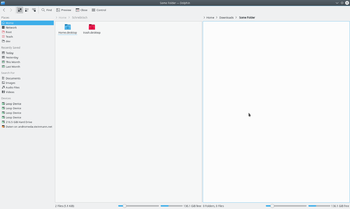
Podeu dividir la vista fent clic a a la barra d'eines, si heu activat la barra de menús, (drecera de teclat F3). Per tornar a una sola vista de carpeta, podeu fer clic a o simplement prémer F3 una altra vegada. El símbol mostrarà quina vista serà tancada. En funció de la vista actualment activa es mostrarà el signe menys a la part esquerra o dreta. La vista activa s'haurà tancat. És important saber-ho si desitgeu utilitzar la drecera de teclat. També hi ha un botó per a dividir i tancar la vista situat a la barra d'eines. Aquest també mostra el símbol menys, així doncs és fàcil saber quina vista serà tancada.
Per descomptat, cada vista té la seva pròpia barra de localització i cada vista pot utilitzar un mode de vista diferent.
Sorting Files
By default, the files in the currently displayed folder are sorted in ascending alphabetical order. However, this can be changed by selecting → .
Files may be sorted by the following attributes
- Name
- Size
- Date
- Permissions
- Owner
- Group
- Type
- Link Destination
- Path
The sorting method can be changed by selecting → → , → → or → → .
View Mode
Dolphin features three different folder view modes:
 Icons shows each file or folder as an icon with its name
Icons shows each file or folder as an icon with its name
 Compact is the same as icons, but in a more compact form, allowing more folders and files to be displayed at once
Compact is the same as icons, but in a more compact form, allowing more folders and files to be displayed at once
 Details presents a list of files and folders, giving information on each, including but not limited to size and date
Details presents a list of files and folders, giving information on each, including but not limited to size and date
The mode can be changed from within Dolphin
- Select from the menu. This option is only available if the main Menubar is enabled
- Select from the menu. This option is only available when the main Menubar is disabled
- By selecting the appropriate icon from the main toolbar, if it is enabled
- Using the default keyboard shortcuts:
- Ctrl+1 switches to the Icon display mode,
- Ctrl+2 switches to Compact and,
- Ctrl+3 switches to Detailed view.
View as Icons
Each file and each folder is represented by an icon in this mode. Alternatively a preview, or of the file can be displayed. Instead of displaying an icon a preview of the file can be shown. This feature can be turned on/off via the menu → (if menu bar is enabled) or via the main toolbar button .
There is the possibility to display additional information below the icons. These can be turned on/off via → or → (if menu bar is enabled). In principal the same criteria which are available as search criteria can be selected.
You can group the icons to achieve a better overview. This is turned on via → or → (if menu bar is enabled). Now the icons are grouped and the groups are divided by a horizontal line containing the name of the group as caption. The grouping is related to the selected search criteria.
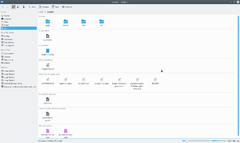
Detalls
En el mode de vista «Detalls» es mostrarà la informació addicional per omissió en contrast amb el mode «Icones». Tots els fitxers són llistats en una taula. El menú contextual de la capçalera de la taula ofereix la possibilitat d'afegir columnes addicionals. Estan disponibles les següents columnes:
- Mida
- Data
- Permisos
- Propietari
- Grup
- Tipus
- Destí de l'enllaç
- Camí
La columna «Nom» sempre serà mostrada. En fer clic una capçalera d'una de les columnes, la taula serà ordenada segons aquesta columna. En fer clic sobre la capçalera de la mateixa columna l'ordre serà invertit.
Since KDE 4.1 it is possible to display the folders as a tree. In this mode a plus sign is shown next to the folder. Plus sign has been replaced by > symbol in newer KDE versions. By clicking on this sign the folder is expanded and all containing sub folders and files are also shown in the table but they are attenuated. By clicking the sign, which displays a minus now (or an arrow pointing downwards in latest versions), again the expansion is closed again. Of course the tree structure can be used for as many folders as wished. In latest KDE releases, the tree view is enabled by default, but can be deactivated via → → → with option .
Columnes
El mode de vista «Columnes» es va inspirar en el gestor de fitxers Finder de Mac OS X. Entrar en un subcarpeta no reemplaça la vista de la carpeta actual però el contingut de la subcarpeta es llista en una columna addicional al costat de la columna de la carpeta pare. Això es pot utilitzar per a diverses jerarquies, amb la finalitat que pugueu navegar de manera simple i ràpida en el sistema de fitxers. Des del KDE 4.8, el mode de vista Columnes ha estat descartat i no estarà disponible a les futures versions de Dolphin.
Setting defaults for all folders
Under → (or under the menu item → if you have enabled menu bar) you can set any of these attributes to be the default for all folder views.
Plafons
Dolphin contains several panels, which can be activated via menu → . Each panel can be placed in the left or right docking area. To move a panel you have to unlock panels (right clik on a panel and select ), click on the header and Drag&Drop the panel. The area where the panel will be placed on mouse released is highlighted. It is possible to stack panels on top of each other. In this case the panels are placed into tabs.
En la capçalera de cada plafó hi ha dos botons. El botó prop del títol desacobla el plafó. Això torna el plafó independent, en una finestra «flotant» sobre de la finestra del Dolphin. La finestra sempre és combinada amb Dolphin i no es pot mostrar sense aquest, així com tampoc es pot minimitzar com una finestra normal. En fer clic de nou sobre el botó, el plafó serà acoblat. El segon botó tanca el plafó.
Diàlegs no modals
Quan moveu, copieu o suprimiu fitxers/directoris el diàleg desapareixerà fins i tot quan l'operació no s'hagi completat. Apareixerà una barra de progrés a sota a la dreta de la pantalla, i en finalitzar l'operació desapareixerà. Si voleu veure el progrés, heu de fer clic sobre la petita icona informativa (i) a la safata del sistema.

Llocs
Dolphin contains a new kind of bookmarks Places. These are displayed in a panel which can be activated via → → (keyboard shortcut F9). The default Places are identical to the ones shown in the category Computer of the K-Menu Kickoff.
En fer clic sobre un d'aquests llocs s'obrirà en la vista de carpeta actual. El menú contextual ofereix la possibilitat de modificar o suprimir els llocs. És igualment possible ocultar temporalment les entrades.
Es pot utilitzar el menú contextual d'una carpeta per afegir-la com a una nova entrada al plafó Llocs. En conseqüència, hi ha un element en aquest menú. Igualment podeu fer una acció arrossega i deixa una carpeta cap al plafó Llocs.
El plafó llocs també conté entrades per als perifèrics amovibles connectats tals que les claus USB o els CD. Una petita icona indica si el dispositiu està muntat. El menú contextual ofereix la possibilitat de desmuntar-los.
Els llocs s'utilitzen com a base a la barra de ruta de navegació fil d'Ariadna. Cada adreça es mostra en relació a la carpeta pare més propera a un dels llocs.
Informació
The information panel can be activated via → → (keyboard shortcut F11). This panel displays a preview or an icon of the currently selected file/folder or of the file/folder below the mouse cursor. Some additional information like change date or size to the file/folder is displayed as well.
El plafó d'informació ofereix la possibilitat de puntuar, afegir un comentari o una etiqueta a un fitxer. Aquesta és una de les interfícies per a l'escriptori semàntic Nepomuk el qual ofereix els avantatges de la web semàntica per a l'escriptori. A partir del KDE 4.2 és possible cercar als enllaços semàntics donats per les etiquetes.
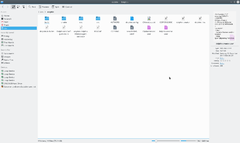

Carpetes
A panel providing a tree structure for the file system can be displayed via → → (keyboard shortcut F7). The tree structure offers the possibility by clicking the > and ˇ signs to expand/collapse sub folders. By clicking on one of the folders the content will be displayed in the current view.
Terminal
The terminal emulator Konsole can be displayed directly in Dolphin via → → (keyboard shortcut F4). This makes it possible to use shell commands directly in Dolphin. The terminal is opened in the folder which is displayed in the current view. Shift + F4 opens Konsole in new window.
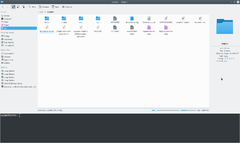
Adreces d'interès i Llocs
Al KDE3 podíeu crear dreceres d'interès al Konqueror, però no estaven disponibles per a les altres aplicacions. El KDE SC 4.x ofereix més flexibilitat -però inevitablement, aporta més complicacions-. De fet, el KDE SC 4 té tres classes d'adreces d'interès que s'han de diferenciar. Estan en fitxers diferents i tenen objectius diferents.
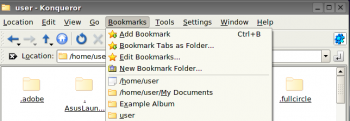
Tres tipus d'adreces d'interès
First, there is the set of bookmarks available only to Konqueror - web bookmarks. These are stored in ~/.local/share/konqueror/bookmarks.xml. Then there is a set which Dolphin calls Places. This set is available to all applications as well as the Dolphin file manager. Every time you use → you will see this set. The third set of bookmarks are Application Bookmarks. These share one file, regardless of the application that set them, and are available to all applications, unless you restrain them to a specific application. More of that later.
Habilitar les adreces d'interès
Bookmarks are not enabled in dialogs by default. To enable them
- Open the menu and select or
- Click the Options
 icon
icon - Select
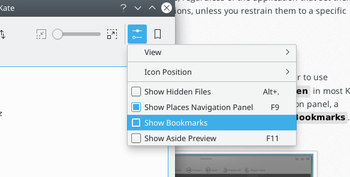
Els Llocs per omissió establerts:
- Inici
- Xarxa
- Arrel
- Paperera
però n'hi podeu afegir d'altres. En Dolphin, feu clic dret sobre una carpeta i seleccioneu , o arrossegueu una carpeta a Llocs.
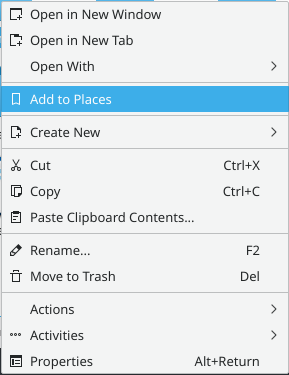
Per omissió aquest «Lloc» serà visible en totes les aplicacions. Si voleu que es mantingui limitat a Dolphin, cal fer clic dret en el nou nom a la llista de llocs, on hi ha l'opció de Edita. Hi ha una casella de selecció .
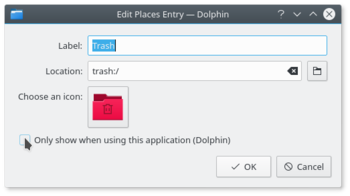
You can see the result of that command if you read ~/.local/share/apps/kfileplaces/bookmarks.xml.
In some applications too there is an option in the File menu to add a folder to Places. At this stage, however, applications vary in which features are available. The important thing to remember is that the default is for Places items to be available to all applications in the → dialogue.
Adreces d'interès a les aplicacions
This is the second class of bookmarks. Remember opening → and using the spanner/wrench? Next to it is a yellow star. This is the bookmark management menu.
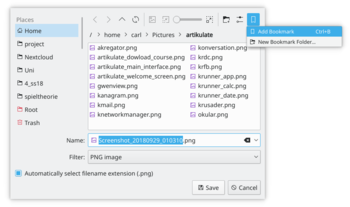
Here you can define bookmarks that will be visible in the same menu on any application. They are stored in one file, ~/.local/share/kfile/bookmarks.xml, which is used by all applications having that menu.
Limitar a una aplicació
Certes aplicacions permeten modificar elements en el menú Llocs. Per exemple, si a Gwenview, feu clic dret sobre una carpeta a Llocs, podeu definir una opció per .
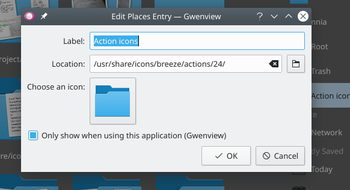
If you need to constrain to an application that does not yet allow you to do that, the only way left is to edit the file ~/.local/share/kfile/bookmarks.xml. Immediately before the </metadata> tag you will need to add the line
<OnlyInApp>appname</OnlyInApp>
Gestió d'arxius en Dolphin
La gestió d'arxius ara es ben simple. En qualsevol directori amb Dolphin, ressalteu els fitxers que voleu comprimir i feu clic dret. En aquest cas, utilitzant l'opció Compressió, podeu optar per crear un arxiu RAR, un arxiu tar amb gzip, o definir una altra manera de compressió que estigui configurada.
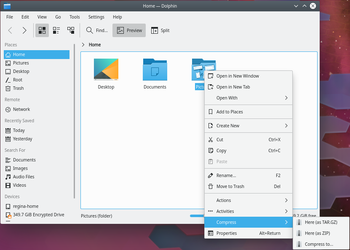
De la mateixa manera, si feu clic sobre un fitxer d'arxiu existent obtindreu una sèrie d'accions afegides al menú del clic dret. Podeu extreure l'arxiu a la carpeta actual, a una subcarpeta detectada automàticament o en un altre lloc de la vostra elecció.
Si voleu afegir fitxers a un arxiu existent, podeu escollir .
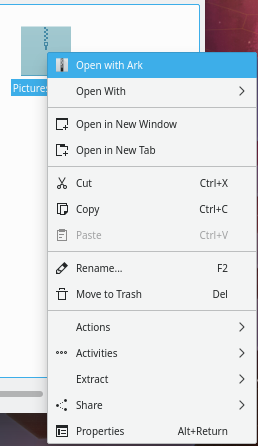
Les accions més útils
Change a File Association on-the-fly
Have you ever wanted to open a file, only to find that it is associated with an application that is not of your choice?
You can, for one, alter this in → → → → . This is the same as running kcmshell5 filetypes in a Konsole.
Alternatively, if you want to change multiple associations right quick, you would edit the *.desktop file directly, e.g. the file /usr/share/applications/org.gnome.Builder.desktop. For example, Gnome Builder associates with a great number of file-types which may not be desirable. So the line
MimeType=application/javascript; # we do not want all of these ....
may be shortened or commented out with # . Maybe a line
InitialPreference=2 X-KDE-InitialPreference=3
in the builder.desktop file helps to keep your previous default associated app, with builder being only secondary or tertiary option.
Thirdly, Dolphin and Konqueror offer a quick method for changing a single association:
Right-click on the file and select . The first line there is descriptive, something like:
Type: XML document
En el mateix nivell, a la dreta, hi ha una clau anglesa. Feu-hi clic i podreu afegir o canviar una associació.
De la mateixa manera, en treballar sobre una carpeta, podeu canviar el gestor de fitxers per omissió de/a Konqueror, si és la vostra opció, o afegir un altre navegador d'imatges per a les possibles associacions.
El submenú Accions
The sub-menu opens up a whole lot more cool things to do from Dolphin. Some possibilities only appear when applicable to the file you have selected. An apps .desktop file below /usr/share/applications defines what actions are applicable for a particular type of file. Some of the options are
- Convert an image file to a different format
- Preview the file
- Download a remote file with KGet
- Sign and/or encrypt the file, according to the encryption software installed
Codificar i copiar pistes d'àudio CD
- Inseriu un CD d'àudio.
- Aneu a aquest CD amb el Dolphin: apareixerà com a «Volum» al plafó 'Llocs' o hi podeu arribar escrivint audiocd: / a la barra d'adreces.
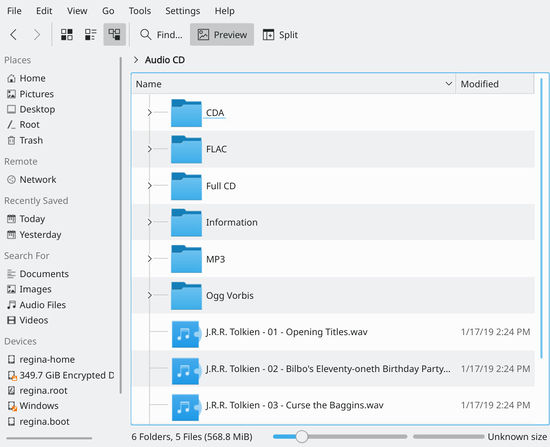
Ara veureu que Dolphin proposa un fitxer WAV per a cada pista, a més de:
- Una carpeta CDA que conté la informació d'indexació en el format CDA habitual.
- Una carpeta CD sencer, que conté un fitxer per a cada format (.cda, .flac, .mp3, .ogg, .wav) amb totes les pistes.
- Una carpeta FLAC, que conté les pistes codificades en format FLAC (format sense pèrdua d'informació).
- Una carpeta Informació que conté la informació CDDB.
- Una carpeta MP3, que conté totes les pistes en format MP3.
- Una carpeta Ogg Vorbis, que conté les pistes codificades en format OGG.
A continuació, només haureu de copiar la carpeta de la vostra elecció, en el format preferit per obtenir la versió codificada de la unitat de CD!
timeline:/ and have your recent files as startup folder
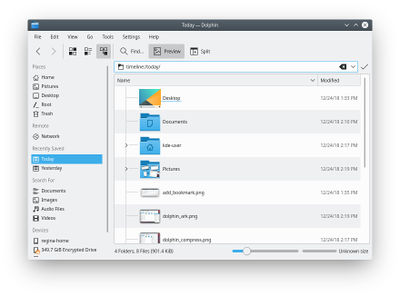
In a current (2017, Version 16.08.3 of) dolphin (with baloo up and running), you can start up dolphin with a view of recently modified files: Just navigate to the address/location of timeline:/today/ (copy paste it to the address bar) or use it as dolphin start-up-folder in dolphin-settings. With older versions of dolphin, this required the below manual steps:
Dolphin té accés a un gran nombre de protocols de transferència de fitxers (els esclaus KIO). Un d'ells és proporcionada pel sistema de cerca semàntica del KDE (Nepomuk). Nepomuk ofereix un protocol de transferència de transferència anomenat historial. Podeu navegar a ell introduint timeline:/ a la barra de localització.
Una particularitat és la possibilitat d'obtenir la carpeta Avui des del protocol timeline:/ a la barra lateral Llocs (només arrossegant-la allà!). A continuació, podeu canviar el nom i la icona (fent un clic dret sobre la nova entrada Avui i escollint ).
Podria ser molt útil disposar d'aquesta vista dels fitxers utilitzats recentment immediatament quan comenci Dolphin. Per desgràcia, al Dolphin 2.1 (part del KDE SC 4.9) això no és possible sense editar el fitxer de configuració del Dolphin. Veure aquest blog per a més detalls sobre això.
Per editar el fitxer de configuració, primer tanqueu totes les finestres del Dolphin. Dolphin desarà la seva configuració en tancar, sobreescrivint qualsevol canvi que hi podríeu haver fet!
Then use KRunner (Alt + F2) to edit ~/.config/dolphinrc with KWrite as follows: kwrite ~/.config/dolphinrc. You can of course use any other editor as well, like Kate. In the configuration file, locate the [General] section to edit the HomeUrl into: HomeUrl=timeline:/today and save the file. You should now have the today view as default and have the files you're most often looking for at your fingertips!
